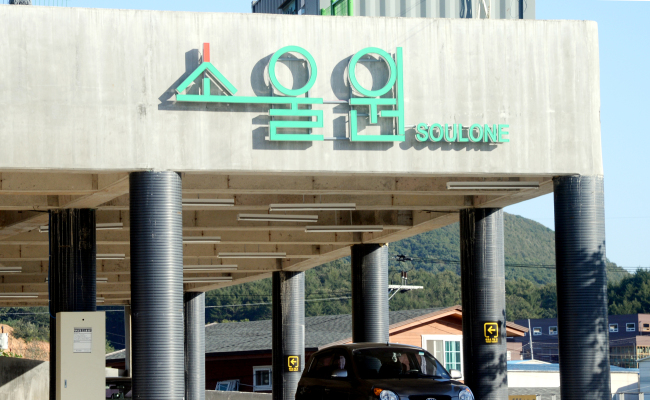Paju getaway: a calming bonsai garden
Soulone is home to rarest, artistic forms of garden trees, bonsai trees and viewing stones
By Lee Woo-youngPublished : Sept. 27, 2013 - 20:24
On a small hill in the northern Gyeonggi Province city of Paju, Soulone, a newly opened tree garden, could become a key attraction in the border city.
Close to some popular destinations such as Imjingak ― a park just 7 kilometers from the DMZ ― and the dynamic cultural scenes in Heyri Art Village and Paju Book City, the garden is an accessible and inviting respite from city life.
Soulone is home to some rare forms of garden trees, bonsai trees and viewing stones that are part of the collection Lee Bum-uk has amassed over his life. Viewing trees and stones have a long tradition in East Asian countries, where people collected them to decorate their courtyards and gardens.
Close to some popular destinations such as Imjingak ― a park just 7 kilometers from the DMZ ― and the dynamic cultural scenes in Heyri Art Village and Paju Book City, the garden is an accessible and inviting respite from city life.
Soulone is home to some rare forms of garden trees, bonsai trees and viewing stones that are part of the collection Lee Bum-uk has amassed over his life. Viewing trees and stones have a long tradition in East Asian countries, where people collected them to decorate their courtyards and gardens.

On the 10,349-square-meter area, trees and stones are on display like works of art. Each tree is notable in age, shape and history, according to Lee.
“The trees here are treasures. They are meant for more than viewing for mere appreciation. The trees are some of the world’s rarest forms and should be protected over generations,” said Lee Bum-uk, owner of Soulone, which opened last month.
After collecting trees and stones for 20 years, Lee, a Seoul resident and president of an advertising firm based in the capital, decided to gather his collections in one place to share them with more people and cut maintenance costs.
The garden is home to pine trees, zelkova, maple trees and cornelian cherry dogwood trees that are as old as 300 to 600 years.
For novice visitors to tree gardens, Lee listed some of the charms he finds in tree forms.
“This 300-year-old pine tree resembles the motion of a dragon ascending to heaven,” Lee said during a guided tour of the garden, pointing to a big tree rising out of the grass.
“The powerful line of the tree trunk and the delicate flow of the stems make it one of the best garden trees that one can find in this country,” Lee noted.
“Without knowing all this, good trees just stand out even to the eyes of ordinary viewers,” he said.
Each tree draws in viewers to the details that elevate the tree to artistic forms.
Twin cornelian cherry dogwood trees that are 400 and 500 years old, respectively, are fun to compare as one has masculine features in the “muscular” tree trunk and the other standing across it has feminine features in its slimmer trunk and curvy stems.
Some unique tree forms were created with the skillful hands of a gardener such as those created by weaving a dead tree and a living tree together.
“It’s a special skill that mixes the dead part of a tree, which has white skin, and the live one that has a darker tone. It’s tricky to create a balance between two trees and is surely a work of art,” said Lee.
Lee also owns miniature trees grown in pots, called bonsai trees. Some notable trees include rare Japanese specimens of Azalea and pine trees.

The garden also features viewing stones with distinctive features such as a large hole that pierces through a hard rock, or a small puddle created by thousands of years of erosion.
Adjacent to the garden is a building with a coffee shop and a restaurant. More spaces are being created to accommodate small weddings, parties and gatherings.
Admission to the garden is 5,000 won for adults and 3,000 won for students and Paju citizens.
For more information, visit www.soulone.co.kr, or call (031) 945-4261.
By Lee Woo-young (wylee@heraldcorp.com)




![[Music in drama] Rekindle a love that slipped through your fingers](http://res.heraldm.com/phpwas/restmb_idxmake.php?idx=644&simg=/content/image/2024/05/01/20240501050484_0.jpg&u=20240501151646)

![[New faces of Assembly] Architect behind ‘audacious initiative’ believes in denuclearized North Korea](http://res.heraldm.com/phpwas/restmb_idxmake.php?idx=644&simg=/content/image/2024/05/01/20240501050627_0.jpg&u=20240502093000)




![[KH Explains] Will alternative trading platform shake up Korean stock market?](http://res.heraldm.com/phpwas/restmb_idxmake.php?idx=644&simg=/content/image/2024/05/01/20240501050557_0.jpg&u=20240501161906)






![[Today’s K-pop] Stray Kids go gold in US with ‘Maniac’](http://res.heraldm.com/phpwas/restmb_idxmake.php?idx=642&simg=/content/image/2024/05/02/20240502050771_0.jpg&u=)